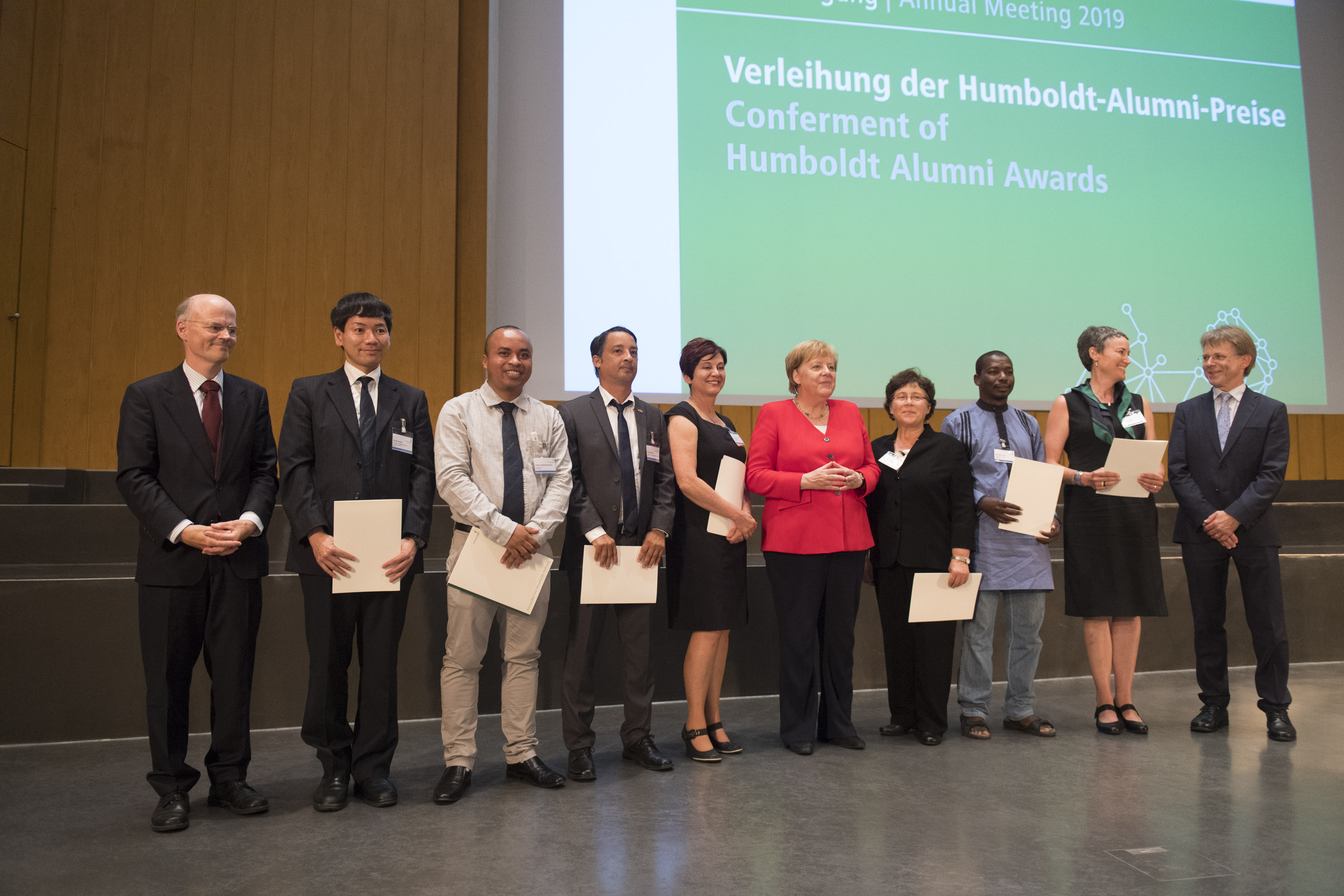Home
How can women help shape societies still governed by traditional authority and institutions, and how can they obtain equal participation in leadership positions generally reserved for the senior male members of royal families? These are some of the questions addressed by the members of the Traditional Governance and Women Network (TG&WN), a global initiative of researchers from Germany, South Africa, Zambia, and the Netherlands. The members of the TG&WN will connect at roundtables to elucidate the tension between traditional forms of government and gender issues.
The networking initiative aims to build sustainable, interdisciplinary research collaborations over continents. Furthermore, the experienced members of the network will communicate information on opportunities for international cooperation to young researchers in law, social science, anthropology, and politics.
-
For more information, contact Prof Christa Rautenbach by email: Christa.Rautenbach@nwu.ac.za
Background
The Alexander von Humboldt Foundation awards prestigious Alumni Awards yearly to support innovative networking initiatives by alumni of their fellowship and award programs. In 2019, Prof Christa Rautenbach was presented with the Alumni Award by the Foundation to establish a Traditional Governance and Women Network (TG&WN).
Photo: The former German Chancellor Angela Merkel, presents the awards to the 2019 winners on 26 June 2019

Collaborators
|

|
Project leader: Prof Christa Rautenbach Professor of Law in the Faculty of Law at the North-West University (Potchefstroom Campus). Her research interests include legal pluralism, customary law, mixed jurisdictions, cultural diversity, judicial comparativism, family law, and the law of succession. See https://law.nwu.ac.za/law/academic-staff. |
|

|
Collaborator: Prof Chuma Himonga Emeritus Professor of Law in the Department of Private Law, University of Cape Town, South Africa and Dean of the School of Law, University of Zambia. Her research expertise includes African Customary Law, Legal Pluralism, and Comparative African Family Law. See https://www.unza.zm/people/school-of-law/department-of-private-law/prof-chuma-himonga. |
|
|
Collaborator: Dr Kyriaki Topidi Dr. habil Kyriaki Topidi is head of the research cluster on “Culture & Diversity” of the European Centre for Minority Issues in Flensburg, Germany. Her research interests focus on diversity management, minority protection rights and mechanisms (with a special interest in religion) and human rights law. See https://www.ecmi.de/the-centre/about-us/people/dr-kyriaki-topidi. |
|

|
Collaborator: Prof Janine Ubink Professor of Law, Governance and Development at the Van Vollenhoven Institute for Law, Governance and Society, Leiden University, the Netherlands. Her research interests include African law and governance, customary law and traditional authorities, law and society, legal pluralism and legal anthropology. See https://www.universiteitleiden.nl/en/staffmembers/janine-ubink#tab-1. |
|
|
Collaborator: Kgosi (Queen) Gaboilelwe Moroka The traditional leader of the Barolong boo Seleka community at Thaba ‘Nchu in South Africa. See https://theafricanroyalfamilies.com/2022/09/13/princess-gaboilelwe-moro…. |
Workshop 1
Workshop 1: The Role of Women in Traditional and Minority Governance

Date: 2 and 3 September 2021 (As a result of the Covid -19 crisis worldwide, the workshop scheduled in 2020 had to be postponed to 2021).
Venue: Main Building F5, Seminar Room 120, Potchefstroom Campus, South Africa
Programme
Video's: Workshop 2 and 3 September 2021
Welcome
Background
Session 1: Role of Women: Views from Academia and Traditional Government
Session 2: Women in Traditional Courts and Succession to Chieftancy
Session 3: New Developments and Challenges
Session 4: New Developments and Challenges
Session 5: Global Developments and Challenges
Session 6: Global Developments and Challenges
Wrap Up and Road Forward
Sponsors
|
|
|
|
|
Workshop 2
Workshop 2: The Role of Women in Traditional and Minority Governance

Video's: Workshop 14 - 15 November 2022
Welcome and Introduction
SESSION 1: GENERAL COMMENTS ON TRADITIONAL LEADERSHIP AND GOVERNANCE
An overview of recent legal developments in traditional leadership and Governance Nic Olivier (Extraordinary Professor, Faculty of Law, NWU, South Africa)
Link to video
Critical evaluation of the orally transmitted"evidence of the dead" and its applicability under the 1996 Constitution and section 3 of the Law of Evidence Amendment Act 45 of 1988 within traditional leadership disputes Tumi Mmusinyane (Professor, Faculty of Law, NWU, South Africa)
SESSION 2: WOMEN AND TRADITIONAL GOVERNANCE
Traditional leadership systems and gender recognition, and women's access to justice in traditional courts Chengetai Hamadziripi (Lecturer, Department of Law,
Midlands State University, Zimbabwe)
Link to video
Strategies to increase women's participation in traditional leadership Pieter Bakker (Professor, College of Law, University of South Africa)
Link to video
A few comments on the Barolong Boo Seleka leadership dispute and the role of women in leadership positions Gaboilelwe Moroka (Queen of the Barolong Boo Seleka Royal Family, Thaba Nchu, South Africa)
SESSION 3: WOMEN AND TRADITIONAL GOVERNANCE IN AFRICA
Women’s participation in indigenous land tenure governance and Africa's "new" indigenous laws Enyinna Nwauche (Professor, School of Law, University of Fort Hare, South Africa)
Link to video
Frozen in time: How judicial resolution of chieftaincy succession disputes contributes to the marginalisation of women in Zambia O'Brien Kaaba (Doctor, School of Law, University of Zambia)
Link to video
"We've been excluded for too long": Women in traditional governance in Ghana Lydia Amoah (PhD Candidate, Institute of African Studies, University of Ghana, Legon)
SESSION 4: GLOBAL PERSPECTIVES
"Khwendo Jirgas": The birth of an all-female informal justice system in Pakistan Neha Gauhar (PhD Candidate, Van Vollenhoven Institute, Leiden, the Netherlands)
Link to video
Political exclusion 3 in 1: The case of Roma women in Romania Oana Buta (Researcher, European Centre for Minority Issues, Flensburg, Germany)
The lived experiences of rural women activists Lerato Ntombela (Land Activist KwaZulu Natal, South Africa)
CLOSURE AND FEEDBACK Rapporteur: Willemien Du Plessis
Sponsors
|
|

|
 |
Publications
Scheepers TE, Du Plessis W, WILLIAMS J, RAUTENBACH C, & de Wet B "Constitutional Provisions on the Role of Traditional Leaders and Elected Local Councillors at Rural Level" 1998 Obiter 61-95
Traditional Authorities Research Group “The Role and Future of Traditional Leaders in South Africa” 1999 Koers 295-324
RAUTENBACH C “Therapeutic Jurisprudence in the Customary Courts of South Africa: Traditional Authority Courts as Therapeutic Agents?” 2005 South African Journal on Human Rights 323-335
RAUTENBACH C “Legal Reform of Traditional Courts in South Africa: Exploring the Links between uBuntu, Restorative Justice and Therapeutic Jurisprudence” 2015 Journal of International and Comparative Law 275-304
RAUTENBACH C “Traditional Courts as Alternative Dispute Resolution (ADR) – Mechanisms in South Africa” in Dietrich F (ed) The Status Quo of Mediation in Europe and Overseas: Options for Countries in Transition (2014 Verlag Dr Kovac Hamburg) pp 288-329
RAUTENBACH C “South Africa: Legal Recognition of Traditional Courts – Legal Pluralism in Action” in Kötter M, Röder TJ, Schuppert GF & Wolfrum R (eds) Non-State Justice Institutions and the Law: Decision-Making at the Interface of Tradition, Religion and the State (Palgrave McMillan 2015) pp. 121-151
RAUTENBACH C “Mapping Traditional Leadership and Authority in Post-Apartheid South Africa: Decentralisation and constitutionalism in Africa” in Fombad C and Steytler N Constitutional Adjudication in Africa (2019 Oxford University Press) pp. 483-519
RAUTENBACH C “Traditional Courts and other Dispute Resolution Mechanisms” in Rautenbach C (ed) Introduction to Legal Pluralism in South Africa (6 ed) (2021 LexisNexis) 261-288
Resources
HEALTH, EDUCATION, CULTURE etc
Contact us
Prof Christa Rautenbach - Christa.Rautenbach@nwu.ac.za



%20G%20Moroka.jpg)

